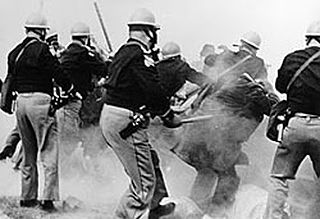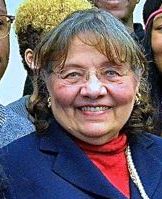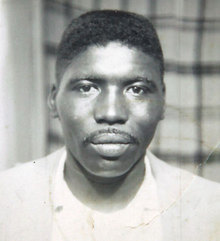Related Research Articles

Selma is a city in and the county seat of Dallas County, in the Black Belt region of south central Alabama and extending to the west. Located on the banks of the Alabama River, the city has a population of 17,971 as of the 2020 census. About 80% of the population is African-American.

The Southern Christian Leadership Conference (SCLC) is an African-American civil rights organization based in Atlanta, Georgia. SCLC is closely associated with its first president, Martin Luther King Jr., who had a large role in the American civil rights movement.

The Selma to Montgomery marches were three protest marches, held in 1965, along the 54-mile (87 km) highway from Selma, Alabama, to the state capital of Montgomery. The marches were organized by nonviolent activists to demonstrate the desire of African-American citizens to exercise their constitutional right to vote, in defiance of segregationist repression; they were part of a broader voting rights movement underway in Selma and throughout the American South. By highlighting racial injustice, they contributed to passage that year of the Voting Rights Act, a landmark federal achievement of the civil rights movement.

Amelia Isadora Platts Boynton Robinson was an American activist who was a leader of the American Civil Rights Movement in Selma, Alabama, and a key figure in the 1965 Selma to Montgomery marches.

Viola Fauver Liuzzo was an American civil rights activist in Detroit, Michigan. She was known for going to Alabama in March 1965 to support the Selma to Montgomery march for voting rights. On March 25, 1965, she was shot dead by three Ku Klux Klan members while driving activists between the cities and transportation.

Freddie Lee Shuttlesworth was an American minister and civil rights activist who led fights against segregation and other forms of racism, during the civil rights movement. He often worked with Martin Luther King Jr., although they did not always agree on tactics and approaches.

Diane Judith Nash is an American civil rights activist, and a leader and strategist of the student wing of the Civil Rights Movement.

Joseph Echols Lowery was an American minister in the United Methodist Church and leader in the civil rights movement. He founded the Southern Christian Leadership Conference with Martin Luther King Jr. and others, serving as its vice president, later chairman of the board, and its third president from 1977 to 1997. Lowery participated in most of the major activities of the civil rights movement in the 1950s and 1960s, and continued his civil rights work into the 21st century. He was called the "Dean of the Civil Rights Movement."
The Women's Political Council (WPC), founded in Montgomery, Alabama, was an organization that formed in 1946 that was an early force active in the civil rights movement that was formed to address the racial issues in the city. Members included Mary Fair Burks, Jo Ann Robinson, Maude Ballou, Irene West, Thelma Glass, and Euretta Adair.

Jimmie Lee Jackson was an African American civil rights activist in Marion, Alabama, and a deacon in the Baptist church. On February 18, 1965, while unarmed and participating in a peaceful voting rights march in his city, he was beaten by troopers and fatally shot by an Alabama state trooper. Jackson died eight days later in the hospital.
James Edward Orange, also known as "Shackdaddy", was a leading civil rights activist in the Civil Rights Movement in America. He was assistant to Martin Luther King Jr. in the civil rights movement. Orange joined the civil rights marches led by King and Ralph Abernathy in Atlanta in 1963. Later he became a project coordinator for Southern Christian Leadership Conference, drawing young people into the movement.
Colia L. Liddell Lafayette Clark was an American activist and politician. Clark was the Green Party's candidate for the United States Senate in New York in 2010 and 2012.
Marie Priscilla Martin Foster was a leader in the Civil Rights Movement in the U.S. during the 1960s. Her successful voter registration in Dallas County, Alabama fueled her to become an activist, and she began teaching adult classes to help people pass the required literacy tests. She was the Alabama foot soldier that convinced Martin Luther King Jr. to come to Selma, Alabama and helped organize the Selma to Montgomery marches in 1965. Her dedication gave her the moniker "The Mother of the Voting Rights Movement," which was shortened to Mother Foster.
Prathia Laura Ann Hall Wynn was an American leader and activist in the Civil Rights Movement, a womanist theologian, and ethicist. She was the key inspiration for Martin Luther King Jr.'s "I Have a Dream" speech.
Annie Lee Wilkerson Cooper was an African-American civil rights activist. She is best known for punching Dallas County, Alabama Sheriff Jim Clark in the face during the 1965 Selma to Montgomery marches. Cooper's lasting legacy is recognized as her activism in the Selma voting rights marches and her role as a female leader in the civil rights movement.

Frederick Douglas Reese was an American civil rights activist, educator and minister from Selma, Alabama. Known as a member of Selma's "Courageous Eight", Reese was the president of the Dallas County Voters League (DCVL) when it invited the Southern Christian Leadership Conference and Martin Luther King Jr. to Selma to amplify the city's local voting rights campaign. This campaign eventually gave birth to the Selma to Montgomery marches, which later led to the passage of the Voting Rights Act.
Johnetta "Netta" Elzie is an American civil rights activist. She is one of the leaders in the activist group We The Protesters and co-edits the Ferguson protest newsletter This Is the Movement with fellow activist DeRay Mckesson.
This is a timeline of the civil rights movement in the United States, a nonviolent mid-20th century freedom movement to gain legal equality and the enforcement of constitutional rights for people of color. The goals of the movement included securing equal protection under the law, ending legally institutionalized racial discrimination, and gaining equal access to public facilities, education reform, fair housing, and the ability to vote.
The Lowndes County Freedom Organization (LCFO), also known as the Lowndes County Freedom Party (LCFP) or Black Panther party, was an American political party founded during 1965 in Lowndes County, Alabama. The independent third party was formed by local African-American citizens led by John Hulett, and by staff members of the Student Nonviolent Coordinating Committee (SNCC) under the leadership of Stokely Carmichael.
Estelle Abrams Witherspoon was an American artist, civil rights activist, and a founding member and longtime manager of the Freedom Quilting Bee. She is also associated with the Gee's Bend quilting group, alongside her mother, Willie "Ma Willie" Abrams.
References
- ↑ "JoAnne Bland". Baylor Magazine. Sep–Oct 2003. Retrieved 28 January 2012.
- ↑ "JoAnne Bland's Biography". The State of the State: Equity, Opportunity & Diversity in Ohio. Retrieved 28 January 2012.
- ↑ Slma Shelbayah and Moni Basu (7 March 2015). "Obama: Selma marchers gave courage to millions". CNN. Retrieved 2019-03-09.
- ↑ bachmanne. "Civil rights activist JoAnne Bland spreads message of hope". King Street Chronicle. Retrieved 27 May 2019.
- ↑ Cortez, Marjorie. "Civil rights activists urge Davis High students to know their history, stand up for others". Deseret News Utah. Retrieved 27 May 2019.
- ↑ bachmanne. "Civil rights activist JoAnne Bland spreads message of hope". King Street Chronicles. Retrieved 27 May 2019.
- ↑ Gee, Denise. "SMU celebrates human rights heroes and the anniversary of its Civil Rights Pilgrimage on Thursday, April 10, 2014". SMU World Changers Made Here. Retrieved 27 May 2019.
- ↑ Noltner, John (10 February 2017). "JoAnne Bland". A Peace of my Mind. Retrieved 28 May 2019.
- ↑ "Reflecting on the 'Legacy of Freedom' tour". Gaston Gazette. Retrieved 2019-03-09.
- ↑ "JoAnne Bland". Ganzel Group, Inc. Retrieved 28 January 2012.
- ↑ Finn, Billy (2018-10-13). ""THE GOOD FREEDOM, Part Two." An interview with JoAnne Bland". Medium. Retrieved 2019-03-09.
- ↑ "O-D-ing on the N-word". Civil Rights Freedom Tour 2013. Retrieved 4 June 2019.
- ↑ "JoAnne Bland "Selma: Turning Point for the Church"". Sixties Survivors. Retrieved 27 May 2019.
- ↑ Blackmon Lowery, Lynda (January 8, 2015). Turning 15 on the Road to Freedom: My Story of the 1965 Selma Voting Rights Movement. Dial. ISBN 978-0-8037-4123-2.
- ↑ Guttentag, Bill (2009). Soundtrack for a Revolution: Freedom Songs from the Civil Rights Era (Film). Freedom Songs Production.
- ↑ "JoAnne Bland "Selma: Turning Point for the Church"". Sixties Survivors. Retrieved 27 May 2019.
- ↑ "Event held 16 days after Martin Luther King Day to draw in student attendance". The Spectator. Retrieved 27 May 2019.
- ↑ "JoAnne Bland". AAE. Retrieved 4 June 2019.
- ↑ Johnson, Sarah. "RACIAL JUSTICE PILGRIMAGE: DAY 3" . Retrieved 27 May 2019.
- ↑ Bunch, Will (25 October 2018). "Survivor of '60s civil rights fight can't believe 2018's voter suppression is so 'blatant'". inquirer.com. The Philadelphia Inquirer.
- ↑ Goodman, Amy (March 7, 2005). "Remembering Bloody Sunday: Thousands Mark 40th Anniversary of Selma Voting Rights March". Democracy Now!. Retrieved 28 January 2012.
- ↑ Finn, Billy (13 October 2018). ""THE GOOD FREEDOM, Part Two." An interview with JoAnne Bland". Medium Corporation. Retrieved 4 June 2019.
- ↑ Gee, Denise. "SMU celebrates human rights heroes and the anniversary of its Civil Rights Pilgrimage on Thursday, April 10, 2014". SMU World Changers Shaped Here. Retrieved 27 May 2019.
- ↑ "Who Is JoAnne Bland?". Journeys for the Soul with JoAnne Bland. Retrieved 27 May 2019.
- ↑ Noltner, John (10 February 2017). "JoAnne land". A Peace of my Mind. Retrieved 27 May 2019.
- ↑ Gee, Denise. "SMU celebrates human rights heroes and the anniversary of its Civil Rights Pilgrimage on Thursday, April 10, 2014". SMU World Changers Shaped Here. Retrieved 27 May 2019.
- ↑ "After Selma". Joan Trumpauer Mulholland Foundation. Retrieved 2020-06-18.